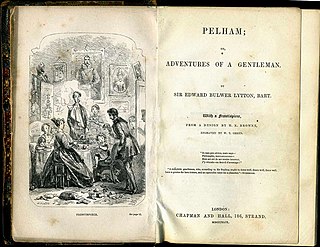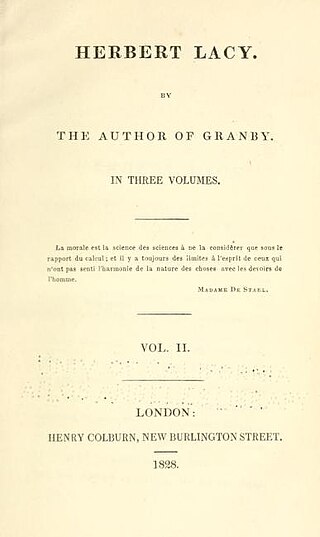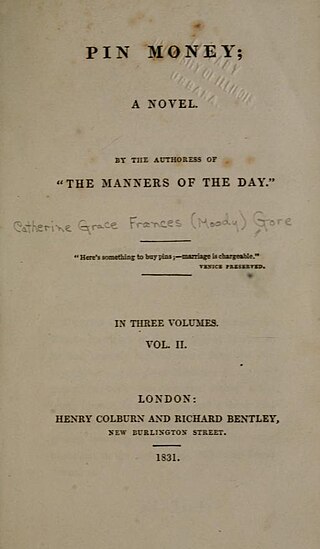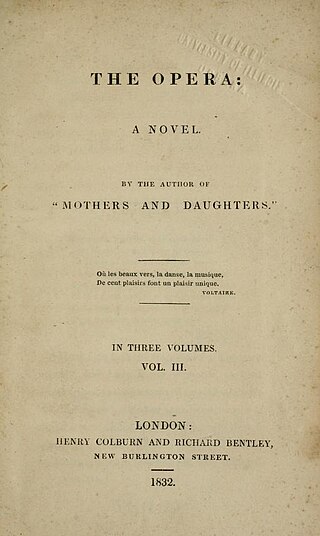Gallia is an 1895 novel written by Ménie Muriel Dowie. It is usually categorised as a New Woman novel.

The Romance of a Shop is an 1888 novel by Amy Levy. The novel centers on the Lorimer sisters, who decide to open their own photography business after the death of their father leaves them in poverty. The novel examines the opportunities and difficulties of urban life for the "New Woman" in the late nineteenth century, maintaining their right to independent opinion and the questioning of social norms.

Out of the Storm is a 1920 American silent drama film directed by William Parke, and starring Barbara Castleton, John Bowers, and Sidney Ainsworth. It is an adaptation of Gertrude Atherton's 1910 novel Tower of Ivory.
Catherine Dorothea Burdett was an Irish novelist who drew mainly on personal experience.

The Separation is an 1830 novel by the British writer Lady Charlotte Bury, published in three volumes. It falls into the tradition of silver fork novels, popular at the time. It was published in New York City by Harper the same year in two rather than three volumes. It was published anonymously, although Bury's authorship was widely known. A reviewer attacked it for recycling the plot entirely from Bury's 1812 novel Self-indulgence, although the resulting publicity seemed to help the novel's sales.

The Exclusives is an 1830 novel by the British writer Lady Charlotte Bury, originally published in three volumes. It is part of the then-popular genre of silver fork novels set in high society. It was also published in New York City by Harper the same year in two rather than three volumes. Although the daughter of a duke herself Bury, writing anonymously, used it as an expose of the manners and behaviour of the elite Ton.

Flirtation is an 1827 novel by the British writer Lady Charlotte Bury, originally published in three volumes. Bury, writing anonymously, was a well-known author of silver fork novels set in high society. It was a popular success and quickly ran through three editions.

The Disowned is a novel by the British writer Edward Bulwer-Lytton, originally published in three volumes. It is part of the then-popular genre of silver fork novels, focusing on British high society of the late Regency era. Like many other silver fork novels it was published by Henry Colburn, with the first volume coming out in 1828 and the latter two in 1829. It is set in the late eighteenth century but the political and social themes it refers to have more relevance to the contemporary 1820s.

Pelham is an 1828 novel by the British writer Edward Bulwer-Lytton, originally published in three volumes. It was his breakthrough novel, launching him as one of Britain's leading authors. It is part of the tradition of silver fork novels that enjoyed great popularity in the late Regency and early Victorian eras. It follows the adventures of Henry Pelham, a young dandy, in Paris, London and the fashionable spa town of Cheltenham.

Herbert Lacy is an 1828 novel by the British writer Thomas Henry Lister, originally published in three volumes. It was part of the then-popular genre of silver fork novels depicting life in the high society of late Regency Britain. It was his second novel following Granby (1826). Much of the plot revolves around politics, with the title character elected to Parliament. It also examines the alliance between the aristocracy and growing middle classes Like many of the silver fork novels it was published by Henry Colburn.

Falkland is an 1827 Gothic novella by the British writer Edward Bulwer-Lytton. It was his first published novel and took inspiration from Johann Wolfgang von Goethe's The Sorrows of Young Werther. The protagonist was likely partly based on Bulwer-Lytton himself. The novel enjoyed success in Germany, but was criticised in Britain as immoral. It was followed by Pelham in 1828, in which he switched to the fashionable silver fork genre, which established him as leading writing in Britain and Europe.

Yes and No is an 1828 novel by the British writer and politician Lord Normanby, originally published in two volumes. It was part of the popular genre of silver fork novels which focused on the British upper classes in the later Regency era. It was his second published work following Matilda in 1825. The novel focuses heavily on the politics of Britain in the late 1820s, focusing on three main protagonists and examining the Whigs, liberal Tories, and Ultra-Tories.

Matilda is an 1825 novel by the British writer and politician Lord Normanby, originally published in two volumes. It was part of the emerging, popular genre of silver fork novels that focused on the fashionable British upper classes in the later Regency era, and was his first published work. He followed it with a second silver fork novel, the political Yes and No in 1828.

Granby is an 1826 novel by the British writer Thomas Henry Lister, published in three volumes. His first novel, it was part of the emerging genre of silver fork novels which take place in fashionable upper class settings of Regency Britain.

Pin Money is an 1831 novel by the British writer Catherine Gore, originally published in three volumes. It was part of the group of silver fork novels published during the later Regency era that focuses on life in the fashionable British upper classes. The Westminster Review considered the male characters to be more skilfully drawn than the female. Another review suggested that there was too much product placement in the novel, advertising the goods of various London shops.

The Cabinet Minister is an 1839 novel by the British writer Catherine Gore, originally published in three volumes. It is part of the tradition of silver fork novels popular during the era which focus on the upper-classes, and part of a subset of books which focus on British politics. It follows events in the Whig movement from the Regency Crisis of 1810 through the Great Reform Act in 1832 to the present in the early years of Queen Victoria's reign.

The Opera is an 1832 novel by the British writer Catherine Gore, originally published in three volumes. It is part of the tradition of silver fork novels focusing on British high society of the later Regency era. One contemporary reviewer launched a critical attack on its elitism, and lack of realism about everyday lives. The novel makes many references to the ongoing debate about the Reform Bill.

Mrs. Armytage; or Female Domination is an 1836 novel by the British writer Catherine Gore, originally published in three volumes. It is a silver fork novel focusing on fashionable high society, a popular genre to which Gore contributed several books. The novel functions as an analogy for the contemporary political situation, with Gore advancing a pro-Whig viewpoint. It was very successful on its release, and was reissued by Gore's publisher Henry Colburn in 1848.

Women as They Are is an 1830 novel by the British writer Catherine Gore, originally published in three volumes.It is part of the silver fork novels focusing on fashionable high society of the later Regency era. It is also known by its subtitle The Manners of the Day. It was her first novel published by Henry Colburn, and was a considerable success. George IV described it as "the best bred and most amusing novel in my remembrance.

Cecil, or Adventures of a Coxcomb is a 1841 novel by the British writer Catherine Gore, originally published in three volumes by Richard Bentley. It is part of the tradition of Silver Fork novels, which had enjoyed great success in the 1820s and 1830s but was coming to an end by the early Victorian era. It offers a retrospective look at the Regency era through the eyes of Cecil, a dandy who lived through it in high society. It was followed by a sequel Cecil, a Peer published the same year.


















